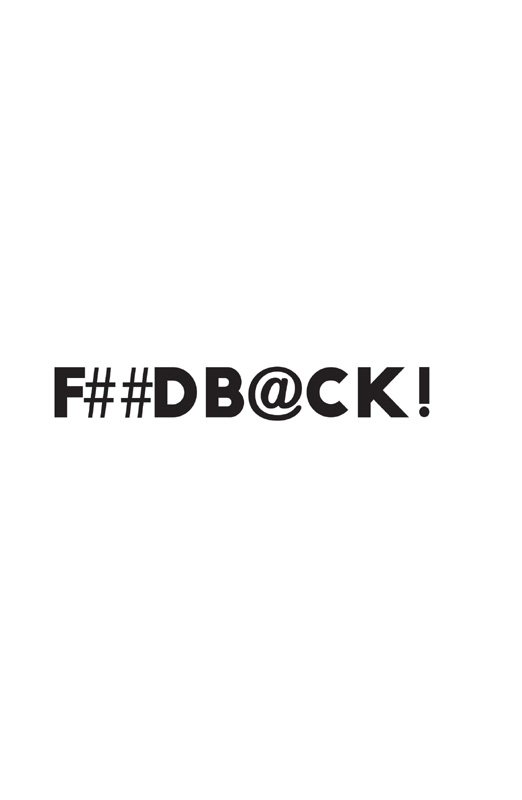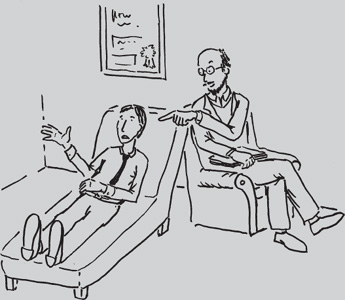CHAPTER 1
FEEDBACK HAS A BRANDING PROBLEM
IF OUR MARKETING COLLEAGUES were to do a branding assessment on feedback it would not score well. This should surprise no one, since it’s been mishandled for centuries by most of humanity. We’ve built its horrible brand one lousy experience at a time. You know what I mean: using feedback to punish, shame, or manipulate. Saving it up and then heaping a big load of it on an unsuspecting employee. Letting our biases influence our perspectives. Insisting on sharing, even if it’s clearly the wrong place and time. Telling one colleague, who tells another colleague, who finally tells the person we were beefing about what we said. Thinking that brutal frankness is the best approach or that passive-aggressive insinuation will get our point across. Sharing only when we want to make it clear that something, or someone, didn’t meet our expectations.
And it’s not just those offering feedback who are to blame. Think about how often we lash out defensively when we’re presented with feedback. We argue the facts, we change the subject to the messenger’s faults, or we get mad and stomp off in a huff. Maybe we listen quietly, then simply shut down. Or, worse yet, we don’t listen at all.
And how often do we actually seek out feedback when we’re stewing on questions like “Am I on the right track in my handling of this project?” or “Could I have done a better job of facilitating that meeting this morning?” For most of us, the instinct is to sit back and wait for someone to give us feedback instead of asking for it.
The root of feedback’s branding problem lies in the way we’re thinking about it and experiencing it. It’s time to examine the habits we’ve formed, the approaches we’ve adopted, and the stories we tell ourselves. If so many of us are walking around wounded by our feedback experiences, then it’s obvious that we’re doing it wrong as a culture. We’ve got our work cut out for us: rebranding feedback as something we want to run toward and not away from is going to require some serious changes to both our heads and our hearts.
HOW FEEDBACK LOST ITS WAY
Bad Habits Learned Early
We learn habits early, both good and bad, from those around us. And, despite our best intentions, we tend to perpetuate learned behaviors or techniques, including those that may have irked us when we were on the receiving end of them.
These early lessons influence our perception of feedback, since we’ve grown up observing, receiving, and shelling it out in ways that too often hurt much more than they help. At its worst, it comes at us in the form of criticisms, angry words, and personal judgments. This harsh form of feedback (or, more accurately, what we’ve gotten used to calling feedback) is often what we experience when we’re young, be it from our parents, our siblings, kids on the playground, or those early (and often horrible) bosses. As a result, we’re conditioned from the get-go to see feedback as a negative force and a source of fear, and since most of us perceive feedback as a negative concept, we’re much less likely to offer it or seek it out. This aversion becomes so strong that, even when feedback is good (meaning it’s positive reinforcement or redirection that’s easy to take in), we may not even recognize it as feedback.
Our bosses, parents, teachers, friends, and siblings probably didn’t set out to do us harm (well, maybe some of our siblings did). They were just influenced by models of feedback that are rooted in our general societal misconceptions. My point is this: we each have a legacy of feedback that is imprinted on us at an early age, and it’s rarely a pretty picture. Letting go of the fear means unlearning the habits that got us here and abandoning the misguided ideas and approaches that have been ingrained in us over the years.
Nothing, Nothing, and Then . . . Boom!
As I’ve made clear, I’m no fan of the traditional performance review. Not only have traditional annual reviews failed to deliver better performance, they’ve also done much to taint our perception of what real feedback is. They’ve trained us to believe that feedback is a big event, something ominous, confrontational, and laden with hidden intentions.
The ritual of the annual review tells us (erroneously) that feedback is what you get when you sit down with your manager behind a closed door, talk about the things that have gone well (we hope), and then discuss your areas for improvement and perhaps how much money you’ll be getting the following year. The mission of the manager is often to tally up and dutifully document your wins and losses for the year and provide you with an assessment of your worth, often in comparison with your peers. It’s likely to be much more of a monologue than a dialogue, and it’s easily biased by influences like recency (the tendency to perceive more recent events as being more impactful than those that are further in the past), and the idiosyncratic rater effect of the manager.1 It requires the participants to mentally “suit up” for battle, and it smacks of positional power, so it rarely feels relaxed or collaborative. When it’s over you quickly forget all the positive takeaways, and instead you obsess about your reviewer’s assessments of your areas for improvement, contemplating whether they were relevant, fair, or even truly representative of your work. This construct, pounded into us by years of annual reviews, has had a toxic influence on our relationship with feedback.
It’s time to reimagine feedback as a fluid and ongoing conversation, free of ratings, angst, and judgment. As we move forward, it will also be crucial to recognize the fact that we’re all getting more feedback than we realize, but that it may not register as feedback when it comes without the sting. Any time a single insight is shared in the moment—even when the manager’s door is open and no one is worried about following an agenda or creating a paper trail—that is feedback. And it’s probably far more digestible and effective than the overwhelming information dump you received during your annual review.
The Feedback Paradox
Surprisingly, the most common complaint we hear about feedback is, “I don’t get enough.” This tells us that despite feedback’s damaged brand most of us still crave it and intuitively know that it’s a good thing—when it’s done right. However, even when we take into account all the “unregistered” feedback we’ve been receiving, most of us are still experiencing a feedback deficit. A 2018 Office Vibe “Global State of Employee Engagement” study2 found that 62 percent of employees want more feedback from their colleagues, and 83 percent said they appreciate feedback, be it positive or negative. This is the paradox: despite the mess we’ve made of it, most of us want more feedback, yet few of us make a habit of actively seeking or extending it. Feedback begets feedback, but somebody needs to help get this ball rolling. What if that somebody were you?


